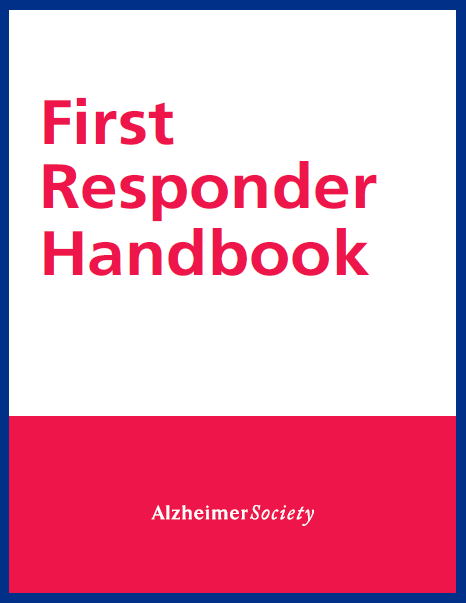I'm a first responder
As a first responder, you may come into contact with a person living with dementia. It's important to be prepared with strategies on how to recognize, communicate with and support a person living with dementia.

Overview
Through various circumstances, people living with dementia sometimes come into contact with police officers, paramedics and search and rescue personnel.
The situations under which you may come into contact with someone living with dementia range from finding a person who is lost, to encountering someone who has been disturbing the peace or has been involved in a criminal activity such as shoplifting.
The purpose of the following information is to provide you with strategies on how to recognize, communicate with and respond to a person living with dementia who may be in need of assistance.
For more information on educational programs and services available in your community, please contact your local Alzheimer Society office.
This handbook expands on the information on this page to provide first responders with more details on how to recognize, communicate with and respond to someone living with dementia.

Recognizing dementia
There are no obvious physical characteristics through which to easily identify a person with dementia. There are, however, clues that may suggest that a person has a form of dementia.
Dementia may be a possibility when an individual:
- Appears confused and disoriented
- Does not understand the current situation or is unable to sort out the obvious, such as their name and address, where they are, or where they are going
- Has no idea about the time of day or how much time has passed since leaving home
- Must be told repeatedly who you are and what you want
- Appears fearful, anxious, angry or is crying
- Provides inappropriate responses to simple questions, or does not respond at all
- May have a blank facial expression or one that is inappropriate to the situation
- Is dressed inappropriately, perhaps overdressed in the summer months or underdressed during cold weather
TIP: You can learn more about dementia and how to recognize it on pages 3 to 5 in our First Responder Handbook, or visit our page about dementia.
Common situations
You may encounter a person living with dementia in a variety of circumstances. The following are some of the more common situations:
- Abuse
- Vehicle collisions
- Getting lost
- Making accusations against others
- Expressing inappropriate behaviour
- Shoplifting
- Appearance of intoxication
- Medical emergencies
- Fires
- Hoarding
TIP: More information to help you understand each of these situations is available on pages 6 to 7 in our First Responder Handbook.
Communication strategies
A person living with dementia will experience a progressive loss of ability to communicate. The further their condition progresses, the less they will be able to express themselves or understand what is being said.
You may find the following strategies helpful when approaching and communicating with a person living with dementia:
- Identify yourself, e.g., “My name is… I’m here to help you get home.”
- Approach the person from the front
- Move slowly; maintain eye contact
- Address the person by name; speak slowly and clearly
- Present one idea at a time
- Repeat/rephrase responses to clarify what they are trying to tell you
- Ask questions requiring “yes” or “no” answers and allow time for a response
- Back up your words with actions or gestures
- Listen actively and acknowledge the person’s emotional state
- Touching too roughly or quickly could cause increased stress
Keep in mind that your uniform may make the person with dementia feel anxious. Removing your cap and speaking in a calm voice may help them feel more comfortable.
TIP: Get additional communication strategies on pages 8 to 9 in our First Responder Handbook.
Any search is an emergency
People living with dementia can become disoriented and lost even in familiar places. Experience within the search and rescue community has revealed the unique actions of people who go missing and has shown the importance of a rapid response.
Research has shown that if a person living with Alzheimer’s disease is not found within 12 hours of being lost, there is a 50% chance that they will be found injured or dead from hypothermia, dehydration or drowning (source). This makes any search an emergency.
Eighty-nine percent of people living with dementia who are lost will be found within 1.6 km of the point last seen (source). When conducting a search and rescue effort, it is important to know the characteristics of the person you’re searching for.
Unique actions of the person living with dementia who is lost may include:
- Not aware that they are lost
- Walk in a straight line until they become stuck
- End up in a secluded spot hidden by brush or other cover or are caught in briars or bushes
- Found in creeks, drainage areas
- Go straight across fields, creeks, climb over obstructions
- Will not walk out of a wooded area
- Hidden from their searchers
- Do not call out for help (may be anxious and fearful of the people who are searching for them)
- Do not respond when their name is called (searchers should stay quiet and listen for auditory clues such as singing or whimpering)
- Often found close to roads and railways
- May be in a heightened state of anxiety
- Often found by people not involved in the search, such as neighbours driving by
Reuniting the individual and the caregiver after a person has been found
Reuniting an individual with their caregivers may be very emotional. The person living with dementia may not recognize caregivers and at the same time, the caregivers may be extremely anxious and under considerable stress.
Regardless of where the reunion takes place, talk to caregivers to ensure that everyone is calm and able to deal with the situation before you leave.
For more information on support services specific to your community, please get in touch with us through the First Link referral service or contact your local Alzheimer Society.
TIP: You can find more advice on reuniting the person and the caregiver on page 10 of our First Responder Handbook.
More information and resources
- First Responder Handbook - this handbook expands on the information above to provide first responders with more details on how to recognize, communicate with and respond to someone living with dementia.
- 10 Communication Tips - this pocket sheet for first responders has helpful tips that anyone can use when talking to a person with dementia
- Tracking Devices - this information sheet gives people living with dementia and caregivers tips on how to choose a tracking device and includes a checklist for comparing devices
- List of tracking devices for people at risk of going missing put together by the University of Waterloo's Aging and Innovation Research Program, in collaboration with the Alzheimer Society of Ontario and AGE-WELL NCE.
- Managing Risks of Disappearance in Persons Living with Dementia (MRDPD) project builds capacities, partnerships and coordination of search and rescue (SAR) personnel, first responders, and communities to manage risks of going missing among persons living with dementia
- Finding Your Way™ - the Alzheimer Society of Ontario works closely with police to provide support for persons with dementia and their families in offering information and training on effective ways to handle missing incidents of people with dementia.
- Jim’s Story - Alzheimer’s advocate Jim Mann, who was diagnosed with Alzheimer’s disease in 2007, shares his story in a new video called “Jim’s Story” about Dementia Friendly Communities. Developed in partnership by the Alzheimer Society B.C. and the City of Vancouver, the video covers Jim’s experience of living with dementia and how communities can support people impacted by the disease
